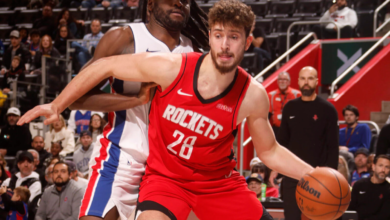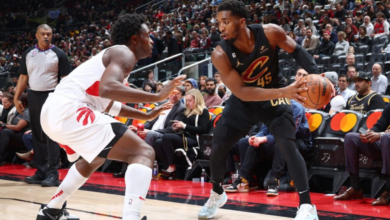Introduction
The Phoenix Suns and the Portland Trail Blazers have long been fierce competitors in the NBA, providing fans with thrilling matchups and unforgettable moments. Their recent clash brought forward intense gameplay, with both teams showcasing their strengths and leaving a lasting impression. While the final score reveals who won, diving deeper into phoenix suns the player stats helps uncover the strategies and performances that shaped the outcome.
In this article, we analyze the key player performances, examine pivotal moments in the game, and compare metrics to understand the dynamics of this epic encounter. Whether you’re a Suns fan, a Blazers supporter, or a basketball enthusiast, this breakdown will offer valuable insights into the game.
Game Overview and Key Moments
Match Summary
The game, held at a packed arena buzzing with energy, was a testament to the competitive spirit of both teams. The Phoenix Suns emerged victorious with a final score of 112-107, but the journey to that result was anything but straightforward. Both teams traded leads throughout the game, with high-intensity plays keeping fans on the edge of their seats.
The Suns leaned on their offensive firepower, utilizing their star players to dominate in crucial moments. Meanwhile, the Blazers countered with their resilience and sharp shooting from beyond the arc. The match was characterized by a fast tempo, aggressive drives to the basket, and a solid defensive presence by both teams.
Turning Points
The game’s turning point came late in the fourth quarter when the Suns’ Devin Booker drained a crucial three-pointer, shifting the momentum decisively. Following this, Kevin Durant stepped up with a clutch mid-range jumper and critical free throws. For the Blazers, Damian Lillard’s leadership kept them within striking distance, but missed opportunities in the final minutes sealed their fate.
Notable plays included Booker’s block on Lillard’s potential game-tying shot and Deandre Ayton’s key offensive rebound in the final minute, which extended the Suns’ lead. These moments underscored the importance of individual efforts in a tightly contested game.
Individual Player Performances

Phoenix Suns Star Performers
Devin Booker led the charge for the Suns, delivering a standout performance with 34 points, 8 assists, and 6 rebounds. His ability to create space and knock down tough shots was instrumental in the team’s success. Booker also contributed defensively, recording 2 steals that disrupted the Blazers’ rhythm.
Kevin Durant added 27 points, showcasing his efficiency with a 58% field goal percentage. His poise under pressure and knack for hitting clutch shots phoenix suns proved invaluable. Deandre Ayton anchored the defense, grabbing 14 rebounds and adding 12 points. His presence in the paint deterred Blazers’ drives and secured second-chance opportunities for the Suns.
Portland Trail Blazers Star Performers
Damian Lillard, as expected, was the Blazers’ driving force. He scored 29 points, dished out 7 assists, and made 5 three-pointers. Despite facing relentless defensive pressure phoenix suns, Lillard’s composure and range kept the Blazers in contention.
Anfernee Simons contributed 22 points, displaying his shooting prowess from beyond the arc. Jusuf Nurkić’s double-double of 15 points and 12 rebounds highlighted his effectiveness in the paint. However, the Blazers’ bench struggled to provide consistent support, which ultimately impacted their ability to maintain momentum.
Role Players and Bench Impact
Role players often determine the depth and sustainability of a team’s performance. For the Suns, Cameron Payne’s energy off the bench added 10 points and vital defensive stops. The Blazers saw flashes of brilliance from Shaedon Sharpe, who contributed 11 points, but lacked the consistency needed to tip the scales.
Comparative Analysis
Offensive and Defensive Stats
Offensively, the Suns outperformed the Blazers with a higher shooting efficiency of 50% compared to the Blazers’ 43%. The Suns also had a slight edge in three-point accuracy, converting 38% of their attempts. On the defensive end, the Suns recorded 8 steals and 5 blocks, showcasing their ability to disrupt the Blazers’ offense.
In contrast, the Blazers won the rebounding phoenix suns battle, securing 48 boards compared to the Suns’ 42. Their dominance on the glass was evident in their 15 offensive rebounds, creating second-chance scoring opportunities.
Team Performance Metrics
The plus-minus ratings painted a clear picture of the Suns’ dominance. Kevin Durant led with a +12 rating, reflecting his overall impact on both ends of the floor phoenix suns. The Blazers’ highest plus-minus belonged to Lillard at +8, but the gap in contributions from other players was evident.
Clutch Performances
In the game’s final minutes, the Suns excelled in clutch situations, with Booker and Durant combining for 12 points in the last three minutes. The Blazers’ missed free throws and turnovers during this period proved costly, underscoring the importance of precision in high-pressure moments.
Insights and Lessons
What the Suns Did Right
The Suns capitalized on their star power and executed well in critical moments. Their ability to generate open looks through effective ball phoenix suns movement and capitalize on defensive stops set them apart. The team’s bench also contributed meaningfully, adding depth to their overall performance.
Where the Blazers Excelled
The Blazers showed resilience, particularly in their rebounding efforts and perimeter shooting. Lillard’s leadership and Simons’ shooting kept the game competitive. However, their reliance on a few players highlighted the need for greater bench productivity.
Areas for Improvement
For the Suns, addressing rebounding weaknesses and minimizing turnovers could further strengthen their game. The Blazers need to enhance their defensive communication and improve their execution during clutch moments. Better utilization of their bench players can also provide the needed spark in tight games.
Conclusion
The Phoenix Suns and Portland Trail Blazers delivered an electrifying game that showcased the intensity of NBA basketball. By analyzing player stats, it’s clear that the Suns’ efficient shooting, clutch performances, and defensive efforts gave them the edge. Meanwhile, the Blazers’ resilience and rebounding prowess demonstrated their potential to compete with the league’s best.
As fans look forward to future matchups, phoenix suns this breakdown provides valuable insights into what each team did well and where they can improve. The stage is set for even more thrilling encounters between these two formidable teams.
FAQs
- What were the standout performances in the Suns vs. Blazers match?
- Devin Booker’s 34 points and Kevin Durant’s clutch shooting were highlights for the Suns. Damian Lillard’s 29 points stood out for the Blazers.
- How do player stats influence game outcomes?
- Metrics like shooting efficiency phoenix suns , rebounds, and assists highlight individual contributions and help analyze overall team strategies.
- Which team had the better defensive performance?
- The Suns excelled defensively with 8 steals and 5 blocks, disrupting the Blazers’ offensive flow.
- What is the significance of plus-minus ratings in basketball?
- Plus-minus ratings measure a player’s overall impact on the game, indicating how the team performed with them on the court.
- Are there any notable records or milestones achieved in this match?
- Devin Booker’s 34-point performance marked another milestone in his career, solidifying his reputation as one of the league’s elite scorers.
You May Also Read:https://techlivenews.co.uk/sacramento-kings-vs-san-antonio-spurs-match-player-stats/




